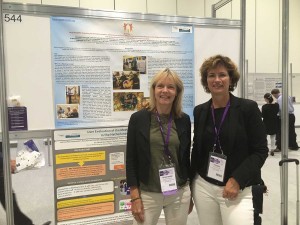BLOG – AAIC 2017 impressions
This year Alzheimer’s Association International Conference was held in London (ExCel exhibition centre) from 16 to 20 July. Over 5000 people from all over the world had registered for the conference. Also some preconferences were organized, of which I attended the Technology and dementia preconference on the 15th of July. Engaging users in development and evaluation of assistive technologies was an important topic, addressed by Maureen Schmitter (US) and Rose-Marie Dröes (NL). Both stressed the importance of including end-users and not to be afraid of getting variability in wishes and needs, as there will be enough general principles that can be taken into account and will meet the needs of larger groups of people with dementia. Ruby Allen (UK) shared her findings on making the informed consent forms more easy to read and understand. Also for caregivers it would be desirable to use these forms, however the ethical committee did not yet give their approval. A disappointing and unnecessarily stigmatising viewpoint. Tony Prescott (UK) gave a lecture on robots and argued that humanoid robots are not needed but smarter robots. He presented MiRo, an animal companionship, that is currently being evaluated. Furthermore, poster “blitz presentations” were given, which helped us to efficiently use our time to consult specific presenters.
 The AAIC main conference aimed to share discoveries in basic and translational research that will lead to methods of prevention and treatment, and improvements in diagnosis for Alzheimer’s disease and other dementias. Although medical topics predominated, for psychosocial researchers plenty of interesting posters and lectures were presented on public health and psychosocial interventions. A new report from the first Lancet Commission on Dementia Prevention and Care was presented. It found nine lifestyle factors relating to for example education, treatment of depression, social isolation and physical inactivity that contribute to the risk of dementia and that are potentially modifiable. By doing so, it could reduce the risk of Alzheimer by 35 percent, and that seems more than we may expect from future drug treatments, considering the fact that it is not expected that one single drug will cure dementia, according to Lon Schneider (US). Many of the psychosocial interventions addressed some of these lifestyle topics with the aim of improving quality of life and well-being, e.g. physical exercise interventions, psychoeducation, cognitive rehabilitation programs, and social participation programs. We had the opportunity to present our results of the successful MeetingDem project. And furthermore, the AAIC conference provided enough opportunities for networking with colleagues, also from our Interdem network!
The AAIC main conference aimed to share discoveries in basic and translational research that will lead to methods of prevention and treatment, and improvements in diagnosis for Alzheimer’s disease and other dementias. Although medical topics predominated, for psychosocial researchers plenty of interesting posters and lectures were presented on public health and psychosocial interventions. A new report from the first Lancet Commission on Dementia Prevention and Care was presented. It found nine lifestyle factors relating to for example education, treatment of depression, social isolation and physical inactivity that contribute to the risk of dementia and that are potentially modifiable. By doing so, it could reduce the risk of Alzheimer by 35 percent, and that seems more than we may expect from future drug treatments, considering the fact that it is not expected that one single drug will cure dementia, according to Lon Schneider (US). Many of the psychosocial interventions addressed some of these lifestyle topics with the aim of improving quality of life and well-being, e.g. physical exercise interventions, psychoeducation, cognitive rehabilitation programs, and social participation programs. We had the opportunity to present our results of the successful MeetingDem project. And furthermore, the AAIC conference provided enough opportunities for networking with colleagues, also from our Interdem network!
Franka Meiland
